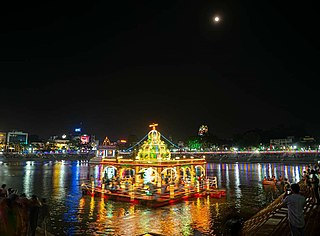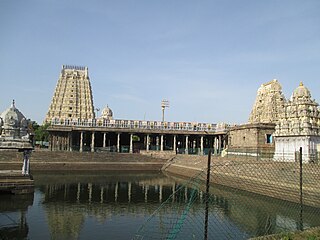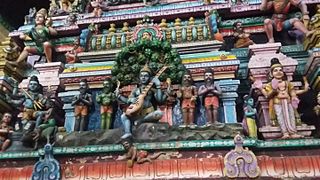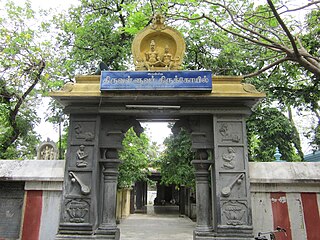
Mylapore is a neighbourhood in the central part of the city of Chennai, India. It is one of the oldest residential parts of the city. It is also called Thirumayilai. The locality is claimed to be the birthplace of the celebrated Tamil philosopher Valluvar and the Hindu saint and philosopher Peyalwar.

Kundrathur is a south western suburb of the city of Chennai, India and it comes under Kanchipuram District limits. It is the birthplace of Sekkizhar, a well-known poet-saint who authored the Periyapuranam.

Ekambareswarar Temple is a Hindu temple dedicated to the deity Shiva, located in the town of Kanchipuram in Tamil Nadu, India. It is significant to the Hindu sect of Saivism as one of the temples associated with the five elements, the Pancha Bhoota Stalas, and specifically the element of earth, or Prithvi. Shiva is worshiped as Ekambareswarar or Ekambaranathar, and is represented by the lingam, with his idol referred to as Prithvi lingam. His consort Parvati is depicted as Elavarkuzhali. The presiding deity is revered in the 7th century Tamil Saiva canonical work, the Tevaram, written by Tamil saint poets known as the nayanars and classified as Paadal Petra Sthalam. The temple also houses Nilathingal Thundam Perumal temple, a Divyadesam, the 108 temples revered in the Vaishnava canon Nalayira Divya Prabhandam.

The Kālikāmbal Temple is a Hindu temple dedicated to Shri Kāligāmbāl (Kāmākshi) and Lord Kamadeswarar, located in Parry's corner locality of the city of Chennai, Tamil Nadu, India. The temple is located in Thambu Chetty Street, a prominent financial street at Georgetown, running parallel to Rajaji Salai.

Thirukkadigai or Sholingapuram in Sholinghur, a village in Vellore district of the South Indian state of Tamil Nadu, is dedicated to the Hindu god Vishnu. Constructed in the Dravidian style of architecture, the temple is glorified in the Divya Prabandha, the early medieval Tamil canon of the Azhwar saints from the 6th–9th centuries AD. It is one of the 108 Divyadesam dedicated to Vishnu, who is worshipped as Lakshmi Narasimhar and his consort Lakshmi as Thirumamagal. There are three separate shrines in the form of Narsimha, Bhaktavatsala Perumal and Hanuman (Anjaneya). They are situated on the larger hill, at the base of the larger hill and on the smaller hill respectively.

Ravishwarar Temple is a Hindu temple in Chennai, India. Built during the Chola period, the temple is dedicated to Shiva. It is located at Murthy Iyengar Street in the northern neighbourhood of Vyasarpadi.

Swetharanyeswarar Temple is a Hindu temple dedicated to the deity Shiva, located in Thiruvenkadu, a village in Mayiladuthurai district in the South Indian state of Tamil Nadu. Shiva is worshiped as Swetharanyeswarar, and is represented by the lingam. His consort Parvati is depicted as Brahmavidyambigai. The presiding deity is revered in the 7th century Tamil Saiva canonical work, the Tevaram, written by Tamil saint poets known as the Nayanars and classified as Paadal Petra Sthalam. It is significant to the Hindu sect of Saivism as one of the temples associated with the nine planet elements, the Navagraha Stalas, and specifically Budha.

Pachaiyappa Mudaliar (1754–1794) or Arcot Pachayyappa Mudaliar was a Madras merchant, philanthropist, and dubash of the 18th century.

Vaithamanidhi Permual Temple is one of the nine Nava Tirupathi, the Hindu temples dedicated to Vishnu. It is located on the Tiruchendur–Tirunelveli route in Tamil Nadu, India, on the southern bank of the Thamiraparani River, 4 km from Alwarthirunagari. It is the eighth temple of Nava Tirupathi, and is named after Mars (Sevvai) and also called Kuberasthalam. Constructed in the Dravidian style of architecture, the temple is glorified in the Divya Prabandha, the early medieval Tamil canon of the Azhwar saints from the 6th–9th centuries AD. It is one of the 108 Divyadesam dedicated to Vishnu, who is worshipped as Vaithamanidhi Perumal and his consort Lakshmi as Kolurvalli.

Chennakesava Perumal Temple is a Hindu temple situated in the George Town neighbourhood of Chennai city, Tamil Nadu, India. It is dedicated to Chenna Kesava Perumal. There is the nearby Chenna Malleeswarar Temple. They are twin temples. The temple was the first to be built in the new settlement; since the construction of Madras city by the British East India Company. Chennakesava Perumal is a manifestation of the Hindu god Vishnu. And considered as the patron deity of Chennai, Chenna pattanam may be named after the Chenna Kesava Perumal Temple. The word 'chenni' in Tamil means face, and the temple was regarded as the face of the city.
Mallikesvarar Temple or Mallikarjunar Temple is a Hindu temple situated in the neighbourhood of George Town in the city of Chennai, India. It is one of the first Hindu temples to be constructed in the British settlement of Madrasapatnam. There is the nearby Chenna kesava perumal Temple. They are twin temples. This is also called Chenna Malleeswarar temple. Chenna pattanam may be named after this deities. The word 'chenni' in Tamil means face, and the temple was regarded as the face of the city.

Thiruvalluvar Temple, also known as the Ekambareswarar–Kamakshi Temple, is a Hindu temple dedicated to the poet-saint Valluvar in the neighborhood of Mylapore in Chennai, India. The shrine is located within the Ekambareswarar temple complex. Believed to have been constructed in the early 16th century, the temple was extensively renovated in the 1970s. Traditionally believed to be the birthplace of Saint Valluvar, the temple is the oldest ever built to Valluvar. The temple also serves as the venue for meetings of Tamil language enthusiasts. While many consider the temple as the birthplace of Valluvar, some consider it as his samadhi.

Nearly 33,000 ancient temples, many at least 800 to 2000 years old, are found scattered all over Tamil Nadu. As per Tamil Nadu Hindu Endowments Board, there are 38,615 temples. Most of the largest Hindu Temples reside here. Studded with complex architecture, variety of sculptures, and rich inscriptions, the temples remain the very essence of the culture and heritage of Tamil land, with historical records dating back to at least 3,000 years.
Parasuramalingeswarar Temple is a Hindu temple situated in the neighbourhood of Ayanavaram in Chennai, India. The presiding deity is Shiva as Parasuramalingeswarar and the goddess is Parvathi. The main idol is in the form of a linga.
Valisvara Temple is a Hindu temple located in the town of Thiruvalisvaram in the Tirunelveli district of Tamil Nadu, South India, India. The temple is dedicated to Lord Shiva. The temple was constructed in the early part of the 10th century AD by Raja Raja Chola I the great Chola King.

Armenian Street, locally known as Aranmanaikaran Street, is one of the historical streets of the commercial centre of George Town in Chennai, India. The road runs north–south and connects Mannady Street in the north with the China Bazaar Road in the south. The street is dotted with several century-old historical structures.

Othandeeswarar Temple in Thirumazhisai Chennai City in Tiruvallur district in the South Indian state of Tamil Nadu, is dedicated to the Hindu god Shiva. It is located 22 km from the state capital Chennai. Constructed in the Dravidian style of architecture, the temple was built during the 11th century by Chola king Kulothunga Chola II. Shiva is worshipped as Othandeeswarar and his consort Parvathi as Kulirvithanayaki.

Metraleeswarar Temple is a Hindu temple dedicated to Shiva, located in Pillaiyar Palayam area in Kanchipuram, Kanchipuram district in Tamil Nadu, India. Metraleeswarar is revered in the 7th century Tamil Saiva canonical work, the Tevaram, written by Tamil saint poets known as the nayanars and classified as Paadal Petra Sthalam, the 275 temples revered in the canon. The temple is believed to have expanded during the 13th century by Later Cholas as indicated in the inscriptions.

Sathyanatheswarar Temple is a Hindu temple dedicated to Shiva, located in the town of Thirukalimedu, near Indira Theertham Kanchipuram, Kanchipuram district in Tamil Nadu, India. Shiva is worshipped as Sathyanatheswarar and his consort Parvathi as Pramarambikai. Sathyanatheswarar is revered in the 7th-century Tamil Saiva canonical work, the Tevaram, written by Tamil saint poets known as the nayanars and classified as Paadal Petra Sthalam, the 275 temples revered in the canon.

Chitragupta temple is a Hindu temple located in Nellukara Street Kanchipuram in the South Indian state of Tamil Nadu. It is one of the rare temples of the Hindu deity Chitragupta, considered to the assistant of Yama, the Hindu god of death. Chitragupta is believed to have emerged from a painting and set as the accountant of good and bad deeds of human beings by Brahma. The temple has a three-tiered Rajagopuram and a single precinct around the sanctum.




















